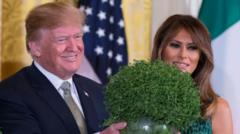This year's trip to Washington for St. Patrick's Day raises questions about its significance, especially with boycotts from certain Northern Irish politicians due to the U.S. administration's policies.
**St. Patrick's Day in Washington: A Tradition Under Scrutiny**

**St. Patrick's Day in Washington: A Tradition Under Scrutiny**
In a year marked by political divisions, Ireland's St. Patrick's Day celebrations in Washington D.C. face challenges as politicians evaluate their participation.
The article text:
As March approaches, so too does St. Patrick's Day—a time of traditional celebrations, shamrock-wearing and community gatherings. Yet, for politicians from the island of Ireland, this period also marks another tradition: the annual pilgrimage to Washington D.C. This gathering includes politicians, business representatives, and lobbyists from both the Republic of Ireland and Northern Ireland, converging on the U.S. capital to attend events tied to the holiday. However, this year, key figures from Northern Ireland are opting out due to Donald Trump's controversial policies.
The core purpose of these trips revolves around building relationships essential for fostering U.S. investment and enhancing the trade dynamic between regions. Veteran attendees, like Steve Aiken—who held positions with the British-Irish Chamber of Commerce and led the Ulster Unionist Party—assert that face-to-face interactions are vital for generating results. Aiken emphasized the limitations of virtual meetings, highlighting the importance of real dialogues to spur significant outcomes.
Moreover, the trip's potential for economic development was underscored by Máirtín Ó Muilleoir, former finance minister of Northern Ireland. Having experienced the atmosphere and opportunities firsthand, he noted that the lead-up to St. Patrick's Day generates a favorable environment for outreach, as American corporations actively promote Irish-related events.
One well-recognized ritual during these festivities is the ceremonial presentation of a bowl of shamrock from the Irish taoiseach (prime minister) to the U.S. president. This tradition, established in 1952, symbolizes ongoing diplomatic relationships. Nevertheless, while such events aim to strengthen ties, the results remain difficult to quantify, with observers noting the necessity of economic fundamentals for tangible outcomes.
Amid changing dynamics, including a significant decrease in political advocacy from the Irish-American community, the challenge remains for politicians on both sides of the border to maintain engagement on vital issues without losing relevance in a competitive global landscape. Aiken remarked on the struggle to keep Irish interests at the forefront in U.S. politics, as ongoing international matters often overshadow them.
This year, political participation is further complicated by dissent, with Sinn Féin and other parties boycotting events in protest of Trump’s policies related to the Israel-Gaza conflict. The Democratic Unionist Party, however, remains committed to attending, viewing these engagements as essential for nurturing long-term relationships. Ó Muilleoir reflected on the weight of such decisions, aligning with the complexities surrounding St. Patrick's Day diplomacy this year in Washington D.C.
As March approaches, so too does St. Patrick's Day—a time of traditional celebrations, shamrock-wearing and community gatherings. Yet, for politicians from the island of Ireland, this period also marks another tradition: the annual pilgrimage to Washington D.C. This gathering includes politicians, business representatives, and lobbyists from both the Republic of Ireland and Northern Ireland, converging on the U.S. capital to attend events tied to the holiday. However, this year, key figures from Northern Ireland are opting out due to Donald Trump's controversial policies.
The core purpose of these trips revolves around building relationships essential for fostering U.S. investment and enhancing the trade dynamic between regions. Veteran attendees, like Steve Aiken—who held positions with the British-Irish Chamber of Commerce and led the Ulster Unionist Party—assert that face-to-face interactions are vital for generating results. Aiken emphasized the limitations of virtual meetings, highlighting the importance of real dialogues to spur significant outcomes.
Moreover, the trip's potential for economic development was underscored by Máirtín Ó Muilleoir, former finance minister of Northern Ireland. Having experienced the atmosphere and opportunities firsthand, he noted that the lead-up to St. Patrick's Day generates a favorable environment for outreach, as American corporations actively promote Irish-related events.
One well-recognized ritual during these festivities is the ceremonial presentation of a bowl of shamrock from the Irish taoiseach (prime minister) to the U.S. president. This tradition, established in 1952, symbolizes ongoing diplomatic relationships. Nevertheless, while such events aim to strengthen ties, the results remain difficult to quantify, with observers noting the necessity of economic fundamentals for tangible outcomes.
Amid changing dynamics, including a significant decrease in political advocacy from the Irish-American community, the challenge remains for politicians on both sides of the border to maintain engagement on vital issues without losing relevance in a competitive global landscape. Aiken remarked on the struggle to keep Irish interests at the forefront in U.S. politics, as ongoing international matters often overshadow them.
This year, political participation is further complicated by dissent, with Sinn Féin and other parties boycotting events in protest of Trump’s policies related to the Israel-Gaza conflict. The Democratic Unionist Party, however, remains committed to attending, viewing these engagements as essential for nurturing long-term relationships. Ó Muilleoir reflected on the weight of such decisions, aligning with the complexities surrounding St. Patrick's Day diplomacy this year in Washington D.C.





















